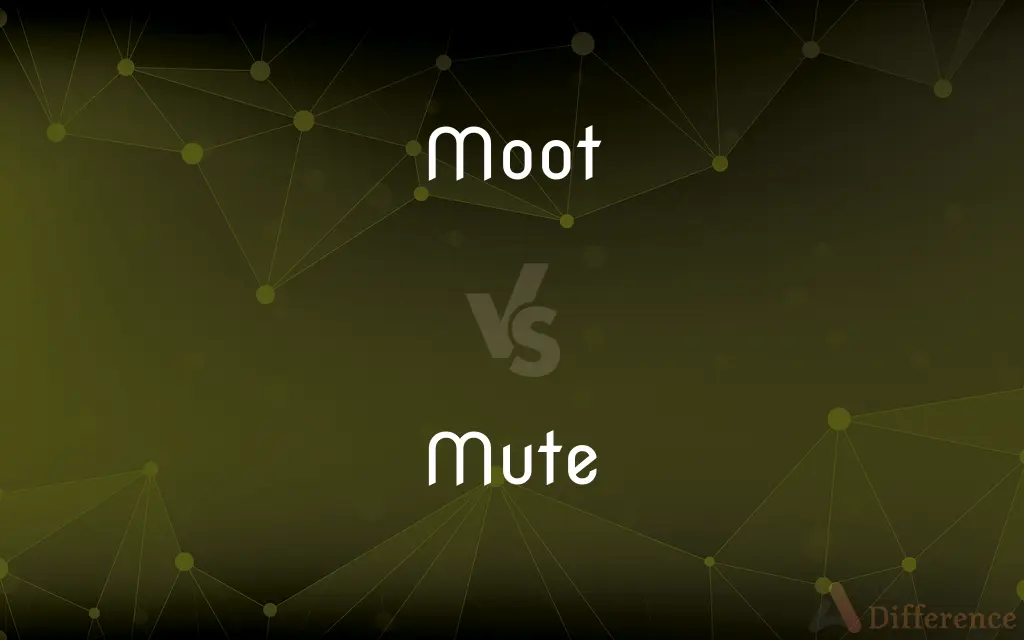Moot vs. Mute — What's the Difference?
By Tayyaba Rehman — Updated on October 27, 2023
Moot pertains to debatable or irrelevant issues, while mute means silent or unable to speak.

Difference Between Moot and Mute
Table of Contents
ADVERTISEMENT
Key Differences
Moot refers to something debatable or academic, often used to indicate a point that's open to argument or has no practical value. It implies a hypothetical situation or a subject for debate. Mute, in contrast, means silent or refraining from speech. It can refer to a person who is unable to speak or an object designed to dampen sound.
In a discussion, a moot point is one that might be interesting to consider but has no real-world application. On the other hand, a person remaining mute during a conversation is either choosing not to speak or is physically incapable of doing so. Moot focuses on the nature of an argument or discussion, while mute focuses on the absence or suppression of sound.
When someone says, "That's a moot point," they usually mean the issue is irrelevant or academic. When they say, "He remained mute," they're indicating that the person didn't speak. The usage of moot often implies a theoretical or irrelevant aspect, whereas mute denotes silence or the lack of speech.
A moot court is a mock court where law students argue imaginary cases for practice. A mute button on a remote control silences the audio. These examples highlight how the words are used in different contexts: moot for debatable or hypothetical scenarios and mute for silence or suppression of sound.
Moot can sometimes be confused with mute, especially in spoken language due to their phonetic similarity. However, their meanings and usage in sentences are distinct, with moot relating to the nature of discussion or debate and mute relating to the absence of sound or speech.
ADVERTISEMENT
Comparison Chart
Meaning
Debatable, irrelevant, or hypothetical.
Silent or unable to speak.
Usage in Context
In debates or academic discussions.
Referring to silence or lack of speech.
Implication
Theoretical or academic point.
Silence or suppression of sound.
Associated Terms
Moot point, moot court.
Mute button, mute person.
Phonetic Similarity
Often confused with mute in speech.
Often confused with moot in speech.
Compare with Definitions
Moot
A point open for debate or argument.
Whether we should go was a moot question.
Mute
Lacking the ability to speak.
The character in the play was mute.
Moot
A topic proposed for debate.
The new policy was a moot issue among the employees.
Mute
An object or button that silences noise.
She pressed the mute button on the TV remote.
Moot
Subject to debate, dispute, or uncertainty
Whether the temperature rise was mainly due to the greenhouse effect was a moot point
It is a moot point whether such a controversial scheme would have succeeded
Mute
Refraining from producing speech or vocal sound.
Moot
Having little or no practical relevance, typically because the subject is too uncertain to allow a decision
The whole matter is becoming increasingly moot
Mute
(Offensive) Unable to speak.
Moot
Raise (a question or topic) for discussion; suggest (an idea or possibility)
The scheme was first mooted last October
Mute
Unable to vocalize, as certain animals.
Moot
An assembly held for debate, especially in Anglo-Saxon and medieval times.
Mute
Expressed without speech; unspoken
A mute appeal.
Moot
A mock judicial proceeding set up to examine a hypothetical case as an academic exercise
The object of a moot is to provide practice in developing an argument
Mute
(Law) Declining to enter a plea to a criminal charge
Standing mute.
Moot
Subject to debate; arguable or unsettled
"It is a moot point whether Napoleon Bonaparte was born a subject of the King of France" (Norman Davies).
Mute
Not pronounced; silent, as the e in the word house.
Moot
Of no practical importance; irrelevant
"[He] was appearing as a goodwill gesture, since the competition was moot for him.
He had long ago qualified for inclusion in the games" (Mark Levine).
Mute
Pronounced with a temporary stoppage of breath, as the sounds (p) and (b); plosive; stopped.
Moot
Not presenting an open legal question, as a result of the occurrence of some event definitively resolving the issue, or the absence of a genuine case or controversy.
Mute
(Offensive) One who is incapable of speech.
Moot
Of no legal significance; hypothetical.
Mute
(Law) A defendant who declines to enter a plea to a criminal charge.
Moot
To bring up (a subject) for discussion or debate.
Mute
(Music) Any of various devices used to muffle or soften the tone of an instrument.
Moot
Subject to discussion (originally at a moot); arguable, debatable, unsolved or impossible to solve.
Mute
A silent letter.
Moot
Being an exercise of thought; academic.
Mute
A plosive; a stop.
Moot
(North America) Having no practical consequence or relevance.
That point may make for a good discussion, but it is moot.
Mute
To soften or muffle the sound of.
Moot
A moot court.
Mute
To soften the tone, color, shade, or hue of.
Moot
A system of arbitration in many areas of Africa in which the primary goal is to settle a dispute and reintegrate adversaries into society rather than assess penalties.
Mute
Not having the power of speech; dumb.
Moot
(Scouting) A gathering of Rovers, usually in the form of a camp lasting 2 weeks.
Mute
Silent; not making a sound.
Moot
(paganism) A social gathering of pagans, normally held in a public house.
Mute
Not uttered; unpronounced; silent; also, produced by complete closure of the mouth organs which interrupt the passage of breath; said of certain letters.
Moot
(historical) An assembly (usually for decision-making in a locality).
Mute
Not giving a ringing sound when struck; said of a metal.
Moot
(shipbuilding) A ring for gauging wooden pins.
Mute
A stopped consonant; a stop.
Moot
A whisper, or an insinuation, also gossip or rumors.
Na, I haven't heard a moot of it.
Haven't you heard the moot, mate? There are going to be layoffs.
Mute
An actor who does not speak; a mime performer.
Moot
Talk.
No, there's no moot of it on the streets.
There's some moot of charges, but nothing concrete yet.
Mute
A person who does not have the power of speech.
Moot
(Australia) Vagina.
Mute
A hired mourner at a funeral; an undertaker's assistant.
Moot
(West Country) The stump of a tree; the roots and bottom end of a felled tree.
Mute
(music) An object for dulling the sound of an instrument, especially a brass instrument, or damper for pianoforte; a sordine.
Moot
A mutual follower on a social media platform.
Mute
An electronic switch or control that mutes the sound.
Moot
To bring up as a subject for debate, to propose.
Mute
A mute swan.
Moot
To discuss or debate.
Mute
The faeces of a hawk or falcon.
Moot
(US) To make or declare irrelevant.
Mute
(transitive) To silence, to make quiet.
Moot
To argue or plead in a supposed case.
Mute
(transitive) To turn off the sound of.
Please mute the music while I make a call.
Moot
To talk or speak.
'Tis no boot to moot again of it.
Mute
Of a bird: to defecate.
Moot
To say, utter, also insinuate.
He could not moot the words.
Mute
(transitive) To cast off; to moult.
Moot
(West Country) To take root and begin to grow.
Mute
To cast off; to molt.
Have I muted all my feathers?
Moot
(West Country) To turn up soil or dig up roots, especially an animal with a snout.
Mute
To eject the contents of the bowels; - said of birds.
Moot
See 1st Mot.
Mute
The dung of birds.
Moot
To argue for and against; to debate; to discuss; to propose for discussion.
A problem which hardly has been mentioned, much less mooted, in this country.
Mute
One who does not speak, whether from physical inability, unwillingness, or other cause.
Moot
Specifically: To discuss by way of exercise; to argue for practice; to propound and discuss in a mock court.
First a case is appointed to be mooted by certain young men, containing some doubtful controversy.
Mute
A letter which represents no sound; a silent letter; also, a close articulation; an element of speech formed by a position of the mouth organs which stops the passage of the breath; as, p, b, d, k, t.
Moot
To render inconsequential, as having no effect on the practical outcome; to render academic; as, the ruling that the law was invalid mooted the question of whether he actually violated it.
Mute
A little utensil made of brass, ivory, or other material, so formed that it can be fixed in an erect position on the bridge of a violin, or similar instrument, in order to deaden or soften the tone.
Moot
To argue or plead in a supposed case.
There is a difference between mooting and pleading; between fencing and fighting.
Mute
Not speaking; uttering no sound; silent.
All the heavenly choir stood mute,And silence was in heaven.
Moot
A ring for gauging wooden pins.
Mute
Incapable of speaking; dumb.
Moot
A meeting for discussion and deliberation; esp., a meeting of the people of a village or district, in Anglo-Saxon times, for the discussion and settlement of matters of common interest; - usually in composition; as, folk-moot.
Mute
Not uttered; unpronounced; silent; also, produced by complete closure of the mouth organs which interrupt the passage of breath; - said of certain letters. See 5th Mute, 2.
Moot
A discussion or debate; especially, a discussion of fictitious causes by way of practice.
The pleading used in courts and chancery called moots.
Mute
Not giving a ringing sound when struck; - said of a metal.
They spake not a word;But, like dumb statues, or breathing stones,Gazed each on other.
All sat mute,Pondering the danger with deep thoughts.
Moot
Subject, or open, to argument or discussion; undecided; debatable; mooted.
Mute
A deaf person who is unable to speak
Moot
Of purely theoretical or academic interest; having no practical consequence; as, the team won in spite of the bad call, and whether the ruling was correct is a moot question.
Mute
A device used to soften the tone of a musical instrument
Moot
A hypothetical case that law students argue as an exercise;
He organized the weekly moot
Mute
Deaden (a sound or noise), especially by wrapping
Moot
Think about carefully; weigh;
They considered the possibility of a strike
Turn the proposal over in your mind
Mute
Expressed without speech; especially because words would be inappropriate or inadequate;
A mute appeal
A silent curse
Best grief is tongueless
The words stopped at her lips unsounded
Unspoken grief
Choking exasperation and wordless shame
Moot
Of no legal significance (as having been previously decided)
Mute
Lacking power of speech
Moot
Open to argument or debate;
That is a moot question
Mute
Unable to speak because of hereditary deafness
Moot
Theoretically interesting but of no practical relevance.
The professor raised a moot point in class.
Mute
Not making any sound.
He remained mute during the argument.
Moot
An issue no longer relevant to current circumstances.
After the decision, all other arguments became moot.
Mute
Choosing not to speak.
He stood mute, refusing to answer.
Moot
Used in hypothetical or academic contexts.
The moot case study was challenging.
Mute
Marked by the absence of sound.
The room fell into a mute stillness.
Common Curiosities
Can someone be temporarily mute?
Yes, if they choose to remain silent for a time.
Is a moot point always irrelevant?
Often, but it can also be a topic for academic debate.
Does mute always refer to people?
No, it can also refer to objects that suppress sound.
Can a legal case be moot?
Yes, if it's no longer relevant or has been resolved.
Is muteness always permanent?
Not necessarily; it can be situational or temporary.
Is every academic discussion moot?
Not always; some have practical applications.
Can animals be mute?
Yes, if they're unable to make vocal sounds.
Is a moot point always negative?
Not necessarily; it can be neutrally academic.
Is muting always deliberate?
It can be intentional or due to physical inability.
Are moot points worth discussing?
They can be, for academic or theoretical exploration.
Are moot points subjective?
They can be, depending on perspective and context.
Can a moot point become relevant?
Yes, if circumstances change.
Can technology be mute?
Yes, when sound functions are disabled or absent.
Does mute imply consent?
No, silence doesn't necessarily imply agreement.
Share Your Discovery

Previous Comparison
Passed vs. Past
Next Comparison
Flautist vs. FlutistAuthor Spotlight
Written by
Tayyaba RehmanTayyaba Rehman is a distinguished writer, currently serving as a primary contributor to askdifference.com. As a researcher in semantics and etymology, Tayyaba's passion for the complexity of languages and their distinctions has found a perfect home on the platform. Tayyaba delves into the intricacies of language, distinguishing between commonly confused words and phrases, thereby providing clarity for readers worldwide.















































